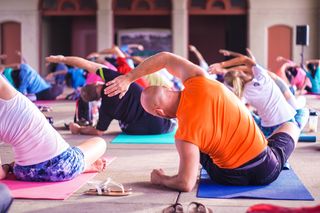Stress
3 Ways to Keep Calm During Quarantine
How to stay calm and cope with stress while maintaining social distancing.
Posted April 13, 2020 Reviewed by Ekua Hagan
I am pleased to welcome Jillian Rigby as my guest blogger for this post on coping. Rigby is currently an intern studying resilience and social equity and is also an EMT. Today, she offers three strategies for coping with stress due to the coronavirus pandemic, based on her experience working with people in high-stress situations.
During the current state of social distancing with regards to the COVID-19 pandemic, times can get stressful. Being strongly encouraged to stay inside may feel limiting or possibly stress-inducing. Although social distancing will benefit us in the future, it can bring stress while we are in the midst of it. Just because we are encouraged to stay home, does not mean we need to feel alone. These times can evoke stressors that may not have been prominent before, however, there are techniques to help with that.
I am currently an intern in Dr. Loretta Brady’s Requity Lab at Saint Anselm College. The work of the lab focuses on fostering resilience and social equity, and we are currently focusing on military and civilian resilience. Many techniques used for these resilience programs provide insight on how to reduce stress and facilitate healthy coping mechanisms. A few healthy ways to cope with stress have been exercise, writing, and meditation, and yoga. And best of all, these activities can easily be done inside!
1. Exercise

Maintaining a stable exercise routine can be beneficial for a few different reasons. First, if exercise is part of your daily routine, continuing that component of your day-to-day activities may help maintain a sense of normalcy to your schedule during a time of uncertainty. Another reason exercise is beneficial (even if it's not something you regularly do) is because of the physical benefits. Exercise has been found to be a great way to relieve stress. Exercise increases the release of endorphins, which are directly linked to improving mood and overall sense of well-being and it helps reduce the number of stress hormones that can build up when we are stressed but sedentary. Glucocorticoids make the cardiovascular tissue more sensitive to the sympathetic tissue, and also enhance epinephrine effects, leading to a feeling of euphoria and an improved mood.
Exercise can also be done at home! Even without any exercise equipment, it’s still possible to add a good workout to your day. High-Intensity Interval Training (HIIT) workouts are another great example of exercises that can be done with just bodyweight. HIIT workouts alternate between high-intensity aerobic exercises and a less intensive rest period. These exercises can be done within 30 minutes and still be an efficient exercise—and they will be sure to get your heart pumping.
2. Writing

Writing is an activity that can reduce stress and negative emotions that can also be done at home. Expressive writing, or more commonly known as writing about your emotions, has supported stress relief as well as increased marital satisfaction within military couples facing the stress of deployment and service. Writing in a journal is a great way to express feelings and alleviate stress. Writing, even without expressing emotion, could be a way to just pass time, for example, writing a short story. Another writing activity could be writing notes or letters. Especially during this time, it is important to remember that although we need to be physically distant from others, we can still be emotionally connected to others. A great way to do that would be writing notes or letters to friends, family, or neighbors. This activity can also be done from the comfort of your own home, and while keeping loved ones in mind. Sharing these letters with a friend will hopefully bring a smile to both your face and theirs.
3. Meditation and Yoga
Another suggestion for a technique to cope with stress is meditation and yoga. Meditation is a great way to calm nerves and increase overall well-being. Along with writing exercises, meditation is a great way to be present in your thoughts. It can also benefit an individual to take a moment to reflect on the things in which to be thankful. Similarly, Mindfulness with Metta (loving-kindness meditation) has shown to be useful in increasing mindfulness, self-compassion, and resilience, three resources especially important when we face uncontrollable stressors.
Physical exercises, such as yoga, also have benefits. Yoga can increase flexibility and help posture. It can also increase blood flow, which like exercise, is beneficial when coping with stress. Additionally, yoga helps you focus and relax your stress reactive nervous system.
During these stressful times, be sure to engage in activities that help alleviate stress. Although we are encouraged to stay inside, these activities can be done right from your home. Remember the importance of maintaining a schedule, getting your heart rate up, and being present with your emotions, whether that be writing them down or just self-reflecting.
© 2020 Jillian Rigby. All rights reserved.
References
Baddeley, J. L., & Pennebaker, J. W. (2011). A postdeployment expressive writing intervention for military couples: A randomized controlled trial. Journal of Traumatic Stress, 24(5), 581-585. doi: 10.1001/jts/20679
Jillian Rigby is a senior at Saint Anselm College. She is a psychology major from Massachusetts. Jillian is a Dean’s List student and holds a Presidential Scholarship as well as being a member of the Psi Chi Honors Society in Psychology, Pi Gammu Mu Honors Society in Social Sciences, and National Honors Society for Leadership and Success. Jillian will pursue a master's degree in industrial organizational psychology in the fall of 2020 to research institutionalized stigma and workforce stressors. She seeks to reduce the stigma against mental health treatment. In addition, she is interested in substance abuse secondary to workforce stressors. Jillian has recently completed research on nicotine dependence via electronic cigarettes as well as comparing military and civilian resilience programs while researching workforce stressors in first responders.
Sherry Hamby, Ph.D. is a Research Professor at the University of the South and the Director of the Life Paths Research Center, a research institute dedicated to identifying the under-appreciated strengths of survivors of violence and other marginalized groups.
Pidgeon, A. M., Ford, L., & Klaasen, F. (2014). Evaluating the effectiveness of enhancing resilience in human service professionals using a retreat-based mindfulness with metta training program: A randomized control trial. Psychology, Health, & Medicine, 19, 355–364. doi:10.1080/ 13548506.2013.806815
Cowen, V. S., Adams, T. B. (2005). Physical and perceptual benefits of yoga asana practice: results of a pilot study. Journal of Bodywork and Movement Therapies, 9(3), 211-219. https://doi.org/10.1016/j.jbmt.2004.08.001


